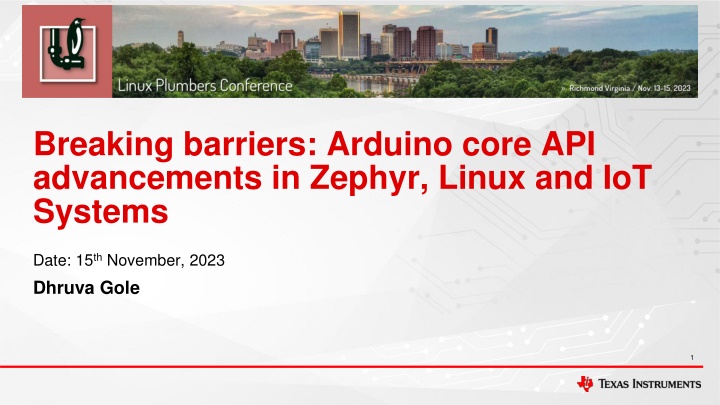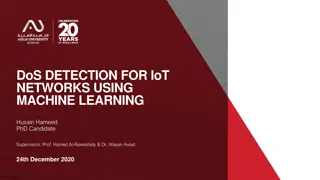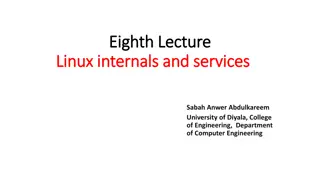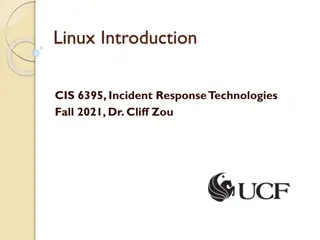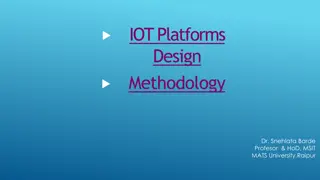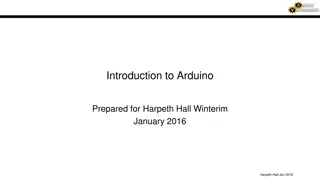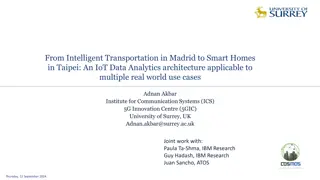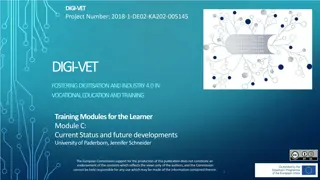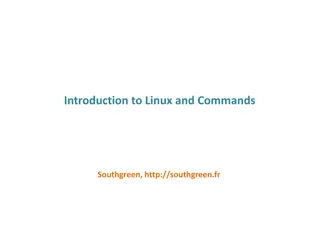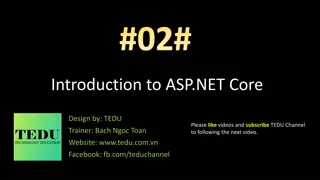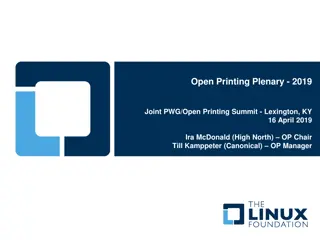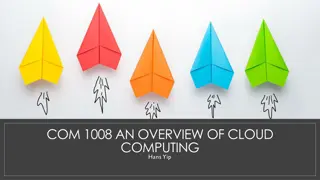Advancements in Arduino Core API with Zephyr and Linux for IoT Systems
Explore the evolution of Arduino Core API with advancements in Zephyr and Linux for IoT systems. Learn how developers can leverage Zephyr RTOS features with Arduino-style syntax, making development easier and more efficient. Discover the benefits of integrating Arduino with Zephyr for enhanced debugging and seamless migration of projects. Dive into the intersection of open-source technologies to break barriers and drive innovation in device architecture.
Download Presentation

Please find below an Image/Link to download the presentation.
The content on the website is provided AS IS for your information and personal use only. It may not be sold, licensed, or shared on other websites without obtaining consent from the author.If you encounter any issues during the download, it is possible that the publisher has removed the file from their server.
You are allowed to download the files provided on this website for personal or commercial use, subject to the condition that they are used lawfully. All files are the property of their respective owners.
The content on the website is provided AS IS for your information and personal use only. It may not be sold, licensed, or shared on other websites without obtaining consent from the author.
E N D
Presentation Transcript
Breaking barriers: Arduino core API advancements in Zephyr, Linux and IoT Systems Date: 15th November, 2023 Dhruva Gole 1
About us: TI Processors and Open source Decades of contribution and collaboration Ingrained culture to give back to the community Upstream FIRST! Focus on long term, sustainable and quality products Upstream and opensource ecosystem in device architecture Upstream FIRST mentality! 2
About me Software Engineer at Texas Instruments, Bangalore. Power Management on Sitara SOC s U-Boot and Linux Device Driver Development Maintainer of Arduino Core API for Zephyr 3
Overview Background About Arduino core API Arduino API + Zephyr Project Structure Challenges Native posix Testing your Arduino Code Future Plans 4
About Arduino What is Arduino? Arduino is an open-source electronics platform easy-to-use for beginners, yet flexible enough for advanced users ArduinoCore-API coded to the C++11 standard API for the Arduino programming language This repository hosts the hardware independent layer of Arduino core. 5
Arduino code generic structure src: https://docs.arduino.cc/built-in-examples/basics/Blink
Arduino + Zephyr = Easier Development Many developers come from an Arduino background Past projects and prototyping are mostly done in Arduino. Requirement to move to an RTOS based system Zephyr seems a lucrative non-vendor specific open source option. Learning new APIs of Zephyr and migrating the entire prototype code is a massive investment. Now, possible to use Zephyr RTOS features with Arduino-style syntax. Leverage the many boards already supported within zephyr, without needing to learn a whole new set of APIs. Eg. TI-CC3220SF Enhanced debugging abilities 9
TI CC3220SF No inherent support in the Arduino IDE Has TI SDK: SIMPLELINK-CC32XX-SDK No support as such to readily run existing Arduino projects/ tutorials. Now Possible! The Arduino core API has support for CC3220SF.
Linux SBC Want to run Arduino code on linux platforms like beagleplay? The beagleplay also comes with it s own MCU cortex M4 core. Opportunity to develop, test and deploy Arduino Code on the edge AM62x: Develop and build your Arduino based app. native_posix/simulator: Run basic checks and test/debug binary. Run/Deploy app onto the M4 core! Handheld BCF: Potentially can also run Arduino code.
BeagleBone AI64 Texas Instruments TDA4VM SOC Dual Arm Cortex-A72 microprocessor Accompanied by Cortex R5 cores Tonnes of I/O s! Excellent platform for rapid yet feature rich application development. GSoC project: Zephyr support for the R5 core
Module structure core Contains the actual implementation and API symlink variants board overlays and header files samples documentation 13
Adding new variants Variants are isolated from the core API for standadization. 2 Easy steps: 1. Add an overlay file that matches the name of the board. (board.overlay) 2. (optional) Add board specific defines to new header file called variants.h One reason for board specific headers is mapping custom pins/LEDs. CC3220SF LaunchXL 14
GPL vs Apache Arduino is LGPL V2 licensed Zephyrproject is Apache licensed. Officially - both of these are incompatible. Hence, Arduino continues to reside as an external repo / module. Any ways to allow mainstream to include Arduino? 17
Integrate arduino api PR#64051 Shifting all overlays to upstream Zephyr. Adding a submanifest for the rest of the module. Add arduino-core shield to handle board specific overlays. Allows us to isolate the GPL code from upstream Zephyr, Keeps the GPL code part of a seperately maintained repo like Arduino Core for Zephyr thus ensuring Apache and GPL don t reside in a single place.
Extending Library Support EEPROM ArduinoBLE SPI
Enhanced debugging options Arduino IDE has limited debugging support. Zephyr + Arduino = no limitations Open OCD Vendor debuggers VS Code
Native POSIX Zephyr application can be compiled together with the Zephyr kernel, creating a normal Linux executable. Board is based on POSIX architecture, shares its basic architecture regarding threading and CPU/HW scheduling https://docs.zephyrproject.org/latest/boards /posix/doc/arch_soc.html
Debugging with Native POSIX RTOS es can be difficult to debug, especially on embedded platforms. Multi-tasking issues RTOS-level tracing Preemption With native posix: debug and instrument as any other native program!
Test/debug using native_posix on host Provides a simple and quick way of prototyping Arduino code. Possible to leverage Zephyr I2C Emulation for I2C testing. Example of basic UART + Threads test
Key Takeaways and Future Scope Upstreaming Arduino Core API to Zephyr. Further expantion of the Arduino API s like SPI, EEPROM, BLE, etc. Adding support for native_sim to allow host level debug and testing. Making it easy to add new variants using something like lopper. Making Arduino code seemlessly work on a POSIX system For eg. running Arduino code on a Beagleplay/BeagleBone AI-64 not just with simulated peripherals but actually use the POSIX calls to make real impact on it s hardware like GPIO, I2C, SPI, etc.
References https://github.com/zephyrproject-rtos/gsoc-2022-arduino-core https://blog.golioth.io/zephyr-arduino-a-google-summer-of-code-story/ https://dhruvag2000.github.io/Blog-GSoC22/ https://github.com/zephyrproject-rtos/zephyr/issues/22247 28
Credits and Acknowledgement Texas Instruments Inc. The Linux Foundation. Golioth.io Vaishnav, Christopher, and TOKITA Hiroshi 29
Q&A Learn more about TI products Contact Information: Dhruva Gole <d-gole@ti.com> Also on IRC @ libera.chat #linux-ti https://www.ti.com/linux http://opensource.ti.com/ https://www.ti.com/processors https://www.ti.com/edgeai 30
